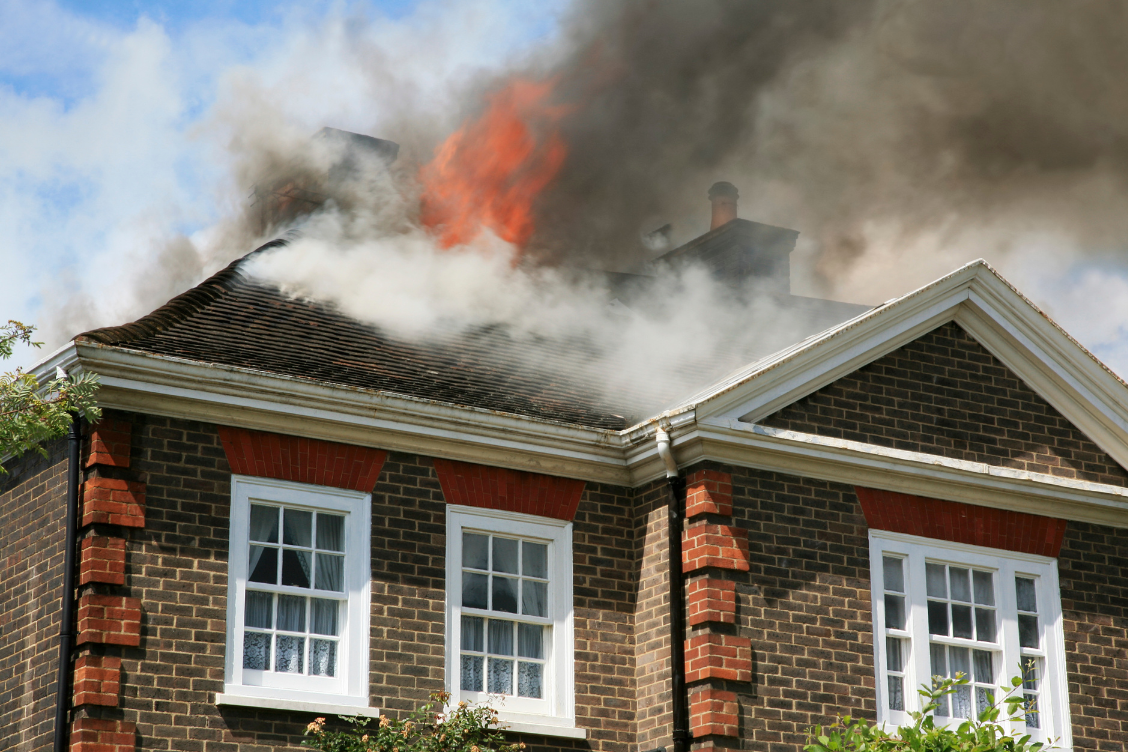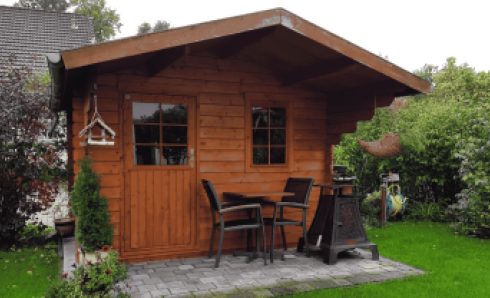We can thank fire for a number of things. Cooked food increased the brain capacity of our distant ancestors, brought us technological advances, kept us warm on chilly cave nights, and allowed our species to thrive in a way no animal ever has. We have a lot to thank fire for, but it remains one of our planet's deadliest, most destructive forces.
Fires are an unfortunate reality that can drastically affect homeowners. A serious fire can wipe away a lifetime’s work in minutes, but understanding how to navigate home insurance after such a traumatic event is crucial.
This article will guide homeowners through the process of dealing with insurance companies and assessing fire damage after a fire incident. Despite our great strides in safety and fire awareness, we will never be able to completely tame fire. We can, however, prepare in the best way possible.
What to Do Immediately After a Home Fire
Immediately after a fire, it's vital to contact emergency services and ensure the safety of all family members. While it can be a stressful, disorientating time, it’s essential to follow these steps:
- Start by calling 999 or 112 and report the situation
- Evacuate the premises and remain a safe distance away
- Do a quick head count. Is anybody missing?
- Attend to any injuries
- Secure the property and inform your insurance company about the incident as soon as possible
How to Manage Insurance Claims After a Fire
In the aftermath of a fire, homeowners should document the damage meticulously and contact their insurance company promptly. Providing detailed information about the incident, including policy details and an initial assessment of the damage, is essential and starts the ball rolling on a process that can sometimes be long and difficult.
Documenting Damage and Gathering Evidence
Take photographs of all affected areas and damaged belongings. This should include not just obvious fire damage but also smoke and water damage. Smoke damage can sometimes be tricky to pick up but often causes discolouration or leaves soot marks.
The smell is another way of knowing, but much harder to document. Smoke will leave a pungent odour that is hard to remove, so make sure you note it while gathering evidence and include it in any claim.
Contacting Your Insurance Company
Initiate contact with your insurance company by providing essential information such as your policy number and the date of the fire. Be prepared to answer any preliminary questions they may have.
Understanding Your Policy Coverage
It’s important to understand your insurance policy's coverage, including its limitations. If you have any doubts, contact the Competition and Consumer Protection Commission, and they’ll be able to give you a non-biased view. However, generally, home insurance falls into three categories:
- Building Insurance - This covers the home itself along with any outer buildings, but not the contents
- Contents Insurance - This covers everything in the home, but not the physical building
- All-risks cover - Usually covers everything unless specified in the agreement
What to Do if a Claim Is Denied or Undervalued?
Claims can be denied or undervalued for several reasons, including suspicions surrounding the fire, a criminal investigation, and an undervalued policy.
If your claim is denied or undervalued - and you believe it’s been done so wrongly - collect additional documentation and evidence to dispute the decision. This can include more detailed reports of the damage or an independent assessment. If the claim is rejected a second time, contact Citizens Advice, and they’ll be able to walk you through your options.
How Long Does the Claim Process Take Post-Fire?
The duration of the claim process can vary. Factors that may affect this include the extent of the damage and the complexity of the claim. Most insurers can get the process completed within a matter of days or weeks.
The Role of Insurance Assessors
Insurance assessors evaluate fire damage and determine the coverage. They play a crucial role in calculating the value of damaged property. This can be a little unnerving when somebody shows up at your house and asks to have a look around the damage, but they’re simply doing their job. Fraudulent claims account for an estimated €200 million annually, which can have a knock impact on the insurance market meaning we all pay for fraudulent claims.
What Are Essential Fire Safety Protocols for Irish Homes?
Fire safety protocols for homes, including installing and maintaining smoke alarms, practising safe electrical habits, having regular fire extinguisher checks, and fire escape planning, are vital for creating a safe environment where the risk of catastrophic fire damage is minimised.
Between 20 and 30 people die each year in Ireland because of fires and associated threats, and sadly, many of them might have been preventable with more stringent fire safety protocols.
1. Installation and Maintenance of Smoke Alarms
Installing smoke alarms in crucial areas like bedrooms and hallways and regularly testing and maintaining them are the cornerstones of everything regarding fire prevention. Around 40% of the fire fatalities across Ireland occur in homes without adequate smoke alarms. 90% of Irish residents report having smoke alarms, but they are not always used correctly. Here’s a quick checklist:
- Place them in the right places, i.e., places susceptible to fires or passways - kitchens, living rooms, corridors
- Make sure there’s one on each level of the house
- Test them once a month and give the area around them a quick clean
- Don’t just take the batteries out because the beeping is annoying. Get it fixed
2. Regular Fire Extinguisher Checks and Accessibility
Fire extinguishers aren’t always standard in residential properties, but having one close by when the worst happens can make a huge difference. Ensure fire extinguishers are accessible and in working condition - regular checks are vital.
3. Safe Electrical Practices and Appliance Usage
Avoid overloading electrical circuits and practise safe appliance usage to prevent electrical fires. Ireland's most common causes of home fires are plugged-in electrical appliances, candles, and burning cigarettes - with the first accounting for around 20% of all fires. Cramming ten plugs into a single socket with a multi-plug might sound convenient, but you’re putting yourself and those around you in danger.
4. Fire Escape Planning and Practise Drills
Develop a fire escape plan and conduct regular drills to ensure everyone knows how to exit safely in an emergency. This might sound a little over the top, but it needn't involve a loudspeaker and stopwatch like in the films. Simply make sure that everybody knows what to do and where to go in the case of an emergency.
5. Safe Storage of Flammable Materials
Store flammable materials like paint and cleaning products safely and well away from potential fire sources.
6. Use of Fireguards and Safe Heating Practices
Implement safe heating practices, including the use of fireguards and cautious use of space heaters. These can be a great idea during those cold winter months, but space heaters can be extremely dangerous when left unattended. At the very least, turn off everything before going to bed.
7. Regular Chimney Cleaning and Inspection
Regularly clean and inspect chimneys to prevent fires. Chimney or flue-related fires account for nearly 30% of all incidents in Ireland, making them one of the biggest dangers. A cosy fire is great, but you need to make sure the area is kept clean.
8. Educating Family Members on Fire Safety Measures
Educate all family members on fire safety, tailoring the information to be age-appropriate. If you need help talking to children about fires, consider the Kids Corner page of the Fire Ireland website, which has specific methods for explaining this challenging topic to young children.
How Can You Cope With the Emotional Aftermath of a Home Fire?
Seeking emotional support through counselling and community networks is vital in coping with the trauma of a home fire. When the smoke clears and the house gets a new lick of paint, it’s tempting to think its job done. However, mental scars can run deep and need to be addressed as quickly as possible.
Seeking Emotional Support and Counseling
Professional counselling can aid significantly in emotional recovery post-fire. Many organisations and professionals in Ireland specialise in this support.
Engaging in Community Support Networks
Community support networks provide emotional and practical support. Engaging with these groups can be instrumental in the recovery process. Sometimes, it’s just good to speak to somebody who has been through the same event as you. This can help you heal and put the trauma behind you.
Keep Your Home Safe With 123.ie
123.ie is committed to home safety and offers comprehensive support to homeowners, including home insurance assistance and safety advice. We will never be able to curb the fire danger that lurks entirely, but we can prepare our homes and put them in the best shape possible to prevent the worst-case scenario.
Ensuring you have suitable home insurance is important as a safety net, but following these steps can reduce your chances of ever needing to make that fire-related phone call in the first place.





